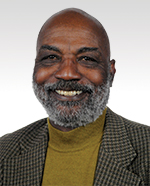
Lewis Bundy
Request AvailabilityLewis Bundy has spent his career working for social justice. He has been a teacher, an administrator, a community organizer and a desegregation consultant. As an organization development consultant, he has provided training and technical assistance to a number of educational and non-profit agencies. Beginning his career as a middle school teacher in East Palo Alto, his focus has been on helping teens and young adults develop the skills to become highly functioning citizens, and helping the adults who work with them to respond appropriately to their needs.
Lewis retired from higher education having served as Director of Student Services at Argosy University in Alameda, California and Assistant Vice President for Student Services at Alliant International University, following a long successful tenure as Director of Academic Services at San Jose State University. His experiences also include: Director of Educational Opportunity Program (EOP) and oversight of TRIO programs, Program Manager for a School Desegregation Assistance Center at Far West Regional Laboratory, Mental Health Association administration and board member for various community organizations.
Lewis received a BA from Occidental College, MA in Educational Administration from San Francisco State University and pursued additional graduate studies at UCLA. He and his wife live in Oakland, CA, where he is the father of four amazing women and four extraordinary grandchildren. He spends most of his discretionary time with his family or in his shed, and plays golf whenever, and wherever, he can.
Workshops
Workshops
- Introduction to the Tools of Cultural Proficiency: This session is for participants new to the Cultural Proficiency Framework. They will learn about the Four Tools of Cultural Proficiency: the Barriers, the Guiding Principles, the Continuum, and the Essential Elements. As a result of this session, participants will be better informed to assess their progress and the progress of their organizations as they move toward creating welcoming, diverse and inclusive communities.
- Going Deeper with the Tools of Cultural Proficiency: Participants will use the Four Tools of Cultural Proficiency: the Barriers, the Guiding Principles, the Continuum, and the Essential Elements to plan for, assess and expand their work in creating welcoming, diverse and inclusive organizational cultures. Participants will be taught to use rubrics based on the essential elements to enhance their professional development programs.
- Making Room at the Table - Moving from Diversity to Inclusion: In this session participants will explore how they use their influence to create inclusive learning communities, and will identify actions they can take when institutional and societal barriers marginalize people who are a part of the educational system.
- Culturally Proficient Organizations - Lessons from Leaders: Cultural Proficiency is represented in the policies and practices of an organization and the values and behaviors of the individuals in that organization. When leaders make a commitment to changing into a culturally proficient organization, it often takes 3-5 years to manifest sustainable, systemic change. This session will present the ten lessons shared by our many clients for leading an organization on a journey toward cultural proficiency.
- Barriers to Culturally Proficient Instruction: One of the principles of cultural proficiency is that people who are not part of the dominant culture have to at least be bi-cultural. In this session participants will explore the inherent barriers to cultural proficiency that are present in a diverse school environment, and identify how educators can capitalize on this dynamic.
- Culturally Proficient Instruction - You Get as Good as you Give: Expectations for student success are communicated in the way the adults build relationships with their students, and in the classroom cultures they create. Participants will learn strategies for effectively communicating to their students: “I see you; I care; and I want to know your story.” These strategies open educators to discovering, with their students, what is the academic best, and how to achieve it.
- Power - Making a Difference with your Personal Styles of Influence: Most people are afraid of power and how it can be used effectively as a management tool. As a result they fail to take advantage of all the personal strengths that are available to them. In this session, participants will identify power styles and determine how they are best used, and discuss the impact of an appropriate use of power on communication and change.
- From Acceptance to Action to Advocacy - Working for the LGBT Community: The issues related to the LGBTQ community as educators, students and parents are many and complex. In this session participants will clarify important terms and concepts, and identify strategies for proactively responding to cultural incompetence toward the LGBT community.
- Working with Kids who Don’t Fit in: While districts across the country are developing anti-bullying programs, it is important to remember that children and youth who are marginalized need help in adjusting to and growing in environments that have been uncomfortable, or blatantly hostile to them. This session provides participants tools and strategies for helping young people who have trouble fitting in, as well as strategies for creating a safe and inclusive environment for all.
- Working with Young Men of Color: This session will help participants to identify factors in the classroom or school environment that create an unhealthy, unwelcoming environment for young men of color. Participants will learn how to read the signs sent by these young men that will open the doors to reaching them and helping them succeed.
- Race, Class, Culture and You: Barriers to cultural proficiency include systems of privilege and oppression, and a sense of entitlement. During this session, participants will clarify the meaning of key terminology in the conversation about race. They will also identify the nature of their privilege in American culture and discern how that privilege undermines or supports their cultural proficiency.
- Code Switch - Strategies for People who Don’t Fit In: People who are not a part of the dominant culture have to at least be bicultural. This session focuses on those people who are oppressed by unhealthy systems or who have not learned how to appropriately code switch. Participants will learn what code switching is and how people who are marginalized by the dominant culture can survive and grow.
- Guerilla Tactics for Change - Responding to Push Back: Leading change can be difficult when people resist or are unaware of the need to adapt. Cultural differences determine how problems are defined and solved. In this session, participants will learn strategies for introducing and supporting needed change in an environment that does not wholeheartedly support in.
-
Cultural Proficiency - An Assets Based Approach to the Conditions of Poverty: Discover what happens to your perspectives and your instructional strategies when you view conditions of poverty as assets. In this session participants will explore their own experiences of privilege and want and will learn to recognize symptoms of poverty that can be used as educational assets.
Books
This is a carousel with book cards. Use the previous and next buttons to navigate.
